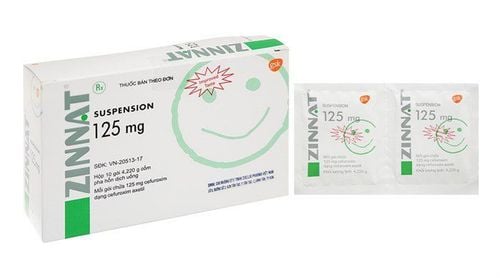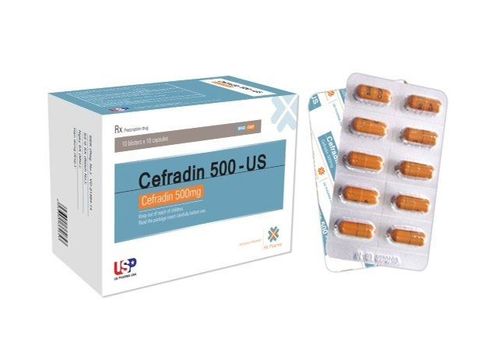This is an automatically translated article.
Menazine is a prescription medicine used to treat certain medical conditions. So what is Menazin and how does it work?
1. Effects of Menazin
Menazine is a bactericidal antibiotic. The drug is prepared in the form of film-coated tablets with the main ingredient in each tablet is 200mg of Ofloxacin.
Ofloxacin is a fluoroquinolone antibiotic similar to ciprofloxacin, but ofloxacin when administered orally has a bioavailability greater than 95%. Ofloxacin has a broad spectrum of antibacterial activity including Enterobacteriaceae, Haemophilus influenzae, Neisseria spp., Pseudomonas aeruginosa, Staphylococcus, Streptococcus pneumoniae and several other gram-positive bacteria.
Ofloxacin is more active than ciprofloxacin against some bacteria including Chlamydia trachomatis, Mycoplasma pneumoniae, Ureaplasma urealyticum. Ofloxacin is also active against Mycobacterium leprae and also Mycobacterium spp. other.
Menazin 200mg is indicated in the following cases:
Severe bronchitis caused by bacteria. Pneumonia . Chlamydia infection of the cervix or urethra with or without gonorrhea. Long uncomplicated Prostatitis Urinary tract infection. Skin and soft tissue infections. Menazin is contraindicated in the following cases:
People with a history of hypersensitivity to ofloxacin or other quinolones and/or other ingredients contained in the drug. People with a history of tendonitis. People who have or have a history of epilepsy or have a low seizure threshold. Children under 15 years old. Pregnant and lactating women because fluoroquinolone antibacterial drugs such as ciprofloxacin, ofloxacin can cause cartilage degeneration in load-bearing joints in test animals. Note when using Menazin 200mg:
Must reduce the dose of Menazin for patients with kidney failure. Allergic reactions and hypersensitivity to fluoroquinolones have been reported after the first dose. Anaphylactic reactions can lead to life-threatening anaphylaxis. In this case, the patient should discontinue treatment with ofloxacin and initiate appropriate shock therapy. Menazin should be used with caution in patients with Clostridium difficile disease, at increased risk of seizures, cardiac disorders, history of psychiatric disorders, impaired liver function, and taking vitamin K antagonists. .... Ofloxacin may impair skills, cause dizziness, drowsiness and visual impairment. Therefore, patients should not drive or operate machinery until it is clear that they are not experiencing the effects of the drug. Alcohol can worsen these effects of Menazine.
2. How to use and dose Menazin
Menazine is used orally, should be swallowed whole with water. Menazin should be taken at least 2 hours away from aluminum or magnesium-containing antacids, sucralfate, and iron-containing products because these drugs can reduce the absorption of ofloxacin.
Dosage of Menazin should be according to the prescription of a specialist, the reference dose for specific cases is as follows:
Adults use the following dose:
Severe bronchitis due to bacterial infection or pneumonia: Use dose 400mg / time every 12 hours, for 10 days. Chlamydia infection in the cervix and ureters: Use a dose of 300mg/time, every 12 hours, for 7 days Uncomplicated gonorrhea: Use a dose of 400mg, a single dose. Prostatitis: Use a dose of 300mg / time, every 12 hours, for 6 weeks. Skin and soft tissue infections: Use 400mg/time, every 12 hours, for 10 days. Urinary tract infections:
Cystitis caused by E. coli or K pneumoniae: Use a dose of 200mg/time, every 12 hours, for 3 days Cystitis caused by other bacteria: Use a dose of 200mg/time , every 12 hours, for 7 days. Complicated urinary tract infections: Use a dose of 200mg/time every 12 hours, for 10 days. Adults with impaired renal function use the following dose:
Creatinine clearance > 50ml/min: Use the same dose as above, every 12 hours. Creatinine clearance: 10 - 50 ml/min: Dose unchanged, every 24 hours. Creatinine clearance < 10 ml/min: Use half the dose and take every 24 hours. Hemodialysis, peritoneal dialysis: Use dose of 100mg/time every 24 hours. If you forget a dose of Menazine, do not take the missed dose. Take only the correct dose of medicine as directed by your doctor.
When using Menazin overdose, symptoms such as gastrointestinal reactions, nausea, vomiting and erosion of the mucosal surface are common. Other symptoms such as convulsions, dizziness, loss of consciousness and seizures may also be experienced.
Treatment of Menazin overdose is as follows:
Symptomatic treatment and ECG monitoring because of possible prolongation of the QT interval. Within 30 minutes of an overdose of Menazine, unabsorbed ofloxacin can be removed using sorbents, sodium sulphate, and gastric lavage. Protect the gastric mucosa with antacids. Elimination of ofloxacin can be increased by enhancing diuresis. Use other therapeutic measures as supportive treatment.
3. Menazin side effects
During the use of Menazin, you may encounter side effects of the drug.
Common side effects of Menazin include:
Nausea, vomiting Diarrhea Abdominal pain Digestive disorders. Headache Dizziness Fatigue, tremor Insomnia Nightmares . Visual disturbances. Rash, supine Hypersensitivity-type skin reaction.
4. Menazin drug interactions with other drugs
Antacids: Serum ofloxacin levels may fall below therapeutic levels when Menazine is used concomitantly with aluminum and magnesium-containing antacids.
Anticoagulants: Ofloxacin in Menazine may significantly increase the anticoagulant effect of warfarin and its derivatives by displacing the serum binding site, prolonging bleeding time. If co-administration is necessary, the prothrombin time should be checked and the dose adjusted if necessary.
Cimeditin co-administered with high doses of Menazin may decrease ofloxacin excretion and increase serum ofloxacin concentrations.
Furosemide co-administered with high doses of menazine may decrease ofloxacin excretion and increase serum ofloxacin concentrations.
Glibenclamide used concurrently with Menazine may increase the serum concentration of glibenclamide.
Methotrexate co-administered with high doses of menazine may decrease the excretion of ofloxacin and increase the serum concentration of ofloxacin.
Probenecid co-administered with high doses of Menazin may decrease Ofloxacin excretion and increase Ofloxacin serum concentrations.
Co-administration of Menazin with theophylline and other drugs that lower the seizure threshold may further lower the seizure threshold. in the brain.
Menazin should be used with caution in patients taking drugs that prolong the QT interval (eg, class IA and III antiarrhythmics, tricyclic antidepressants, antipsychotics, macrolides).
Hope the above sharing will help you understand how to use and use Menazin. If you have any further questions, you can contact your prescribing physician for in-depth advice.
Please dial HOTLINE for more information or register for an appointment HERE. Download MyVinmec app to make appointments faster and to manage your bookings easily.













